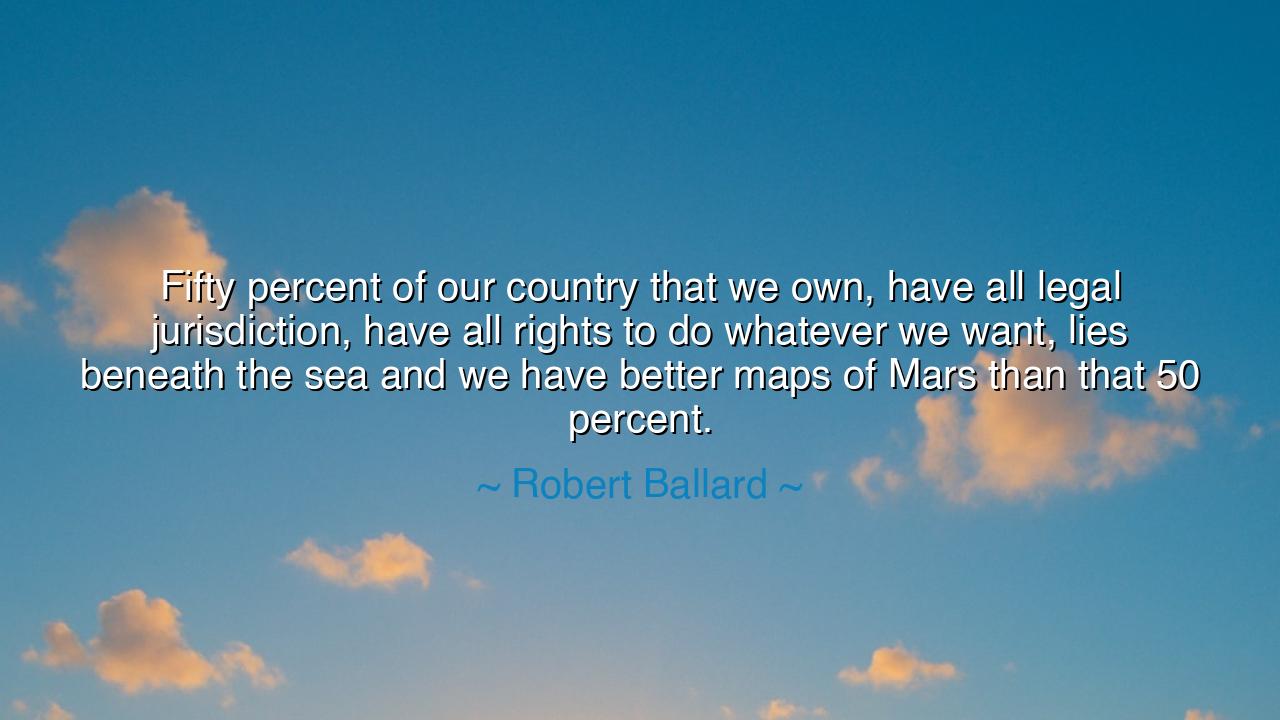
Fifty percent of our country that we own, have all legal
Fifty percent of our country that we own, have all legal jurisdiction, have all rights to do whatever we want, lies beneath the sea and we have better maps of Mars than that 50 percent.






There are truths that awaken us not with thunder, but with silence—the silence of the deep. When Robert Ballard, the explorer who found the Titanic, declared, “Fifty percent of our country that we own, have all legal jurisdiction, have all rights to do whatever we want, lies beneath the sea and we have better maps of Mars than that 50 percent,” he spoke not merely of geography, but of human neglect. His words shine like a lantern in the abyss, revealing how mankind, so eager to touch the stars, has forgotten the mysteries that lie at its very feet. He calls us to remember that knowledge is not only above us, but below us, and that the unknown still whispers in the dark waters of our own planet.
The origin of this quote is rooted in Ballard’s life’s work—decades spent charting the hidden realms beneath the ocean’s surface. A pioneer of underwater exploration, he led the missions that unveiled the resting places of lost ships and ancient secrets of the sea. Yet, through his triumphs, he was haunted by a startling truth: despite all our satellites and telescopes, humanity knows more about distant planets than about its own oceans. The seas, which cover the majority of the Earth and sustain its life, remain a wilderness of shadows. His words are both lament and challenge, a call to rediscover the world we have ignored.
In the days of the ancients, the sea was seen as a realm of gods and monsters—a border between the known and the divine. The Greeks spoke of Poseidon’s dominion, and sailors who crossed his waters did so with prayers and trembling hearts. Yet even in their fear, they respected the ocean as a living power, a source of both terror and creation. Ballard’s lament reminds us that we have lost that reverence. In our arrogance, we have charted galaxies but neglected the kingdom of the deep, as though the treasures beneath the waves were less worthy of awe than the fire of the stars. His message is not of reproach, but of remembrance—an urging to rekindle our curiosity and humility before the mysteries that sustain us.
Consider the story of Prince Henry the Navigator, who in the 15th century set out to explore the coasts of Africa when others feared to sail beyond the horizon. His courage birthed the Age of Discovery, a time when men dared to cross uncharted waters for the promise of knowledge. Yet even those explorers, for all their daring, mapped only the surface of the ocean. The depths remained untouched, unreachable. Now, in the modern age, with machines that can dive to the deepest trenches, our ignorance persists not from inability, but from indifference. Ballard’s warning strikes at the heart of this failing: that we, inheritors of the Earth, have ceased to wonder at what we already possess.
His mention of “legal jurisdiction” carries its own wisdom. He reminds us that the oceans beneath our shores are not some foreign wilderness—they are ours, part of our nations, part of our destiny. To say that we “own” half our country beneath the sea is to confront the irony of ownership without understanding. What good is dominion if it lies in darkness? What good is possession if it inspires no stewardship? The ancients taught that true rulership requires knowledge and care. To govern the land without knowing the sea is to rule with half a vision—to walk with one eye closed while the other dreams of the stars.
Yet beneath the warning lies a call to imagination and responsibility. Ballard does not speak as one who despairs, but as one who believes in humanity’s boundless potential. The oceans are not merely unexplored—they are untapped realms of discovery, holding the keys to medicine, energy, climate, and history. He urges us to turn our gaze inward, to seek adventure not only in the heavens, but in the heart of our own blue planet. The same spirit that sent humankind to Mars can send it to the Mariana Trench; the same drive that mapped the cosmos can illuminate the abyss. For as long as the seas remain unknown, so too does a part of our own story remain unwritten.
The lesson is both simple and profound: seek to know what you already possess. The treasures of life are not always in the distant or the new; they are often hidden in the familiar, waiting for eyes brave enough to see. Just as a man must explore the depths of his own soul to understand himself, so too must humanity explore the depths of its world to understand its place in creation. To ignore the sea is to ignore half of life, half of history, half of being. Let us, then, awaken our wonder—not only for the stars above, but for the waters below.
Thus, in the voice of Robert Ballard resounds an eternal truth for all ages: the unknown is not far away—it is here, beneath us, waiting. The oceans call to us as they called to the ancients, whispering that mastery without knowledge is folly, and that the truest adventure lies not in conquest, but in understanding. Let those who inherit the Earth remember: the map of human destiny is not complete until the deep has been known, honored, and explored.






AAdministratorAdministrator
Welcome, honored guests. Please leave a comment, we will respond soon